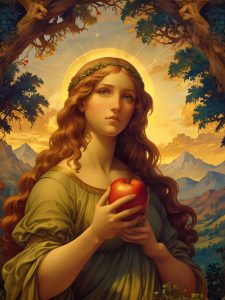Genesis 3:1-5 NIV
Now the serpent was more crafty than any of the wild animals the Lord God had made. He said to the woman, “Did God really say, ‘You must not eat from any tree in the garden’?”
Genesis 3:1-5 NIV
The woman said to the serpent, “We may eat fruit from the trees in the garden, but God did say, ‘You must not eat fruit from the tree that is in the middle of the garden, and you must not touch it, or you will die.’ ”
“You will not certainly die,” the serpent said to the woman. “For God knows that when you eat from it your eyes will be opened, and you will be like God, knowing good and evil.”



In this chapter of our AI generated bible images, let’s dive into Genesis 3. It’s a familiar story, but there’s always something new to learn!
Verse 1: Establishing the Scene
The serpent, dubbed the “most crafty” animal, sets the scene. Some translations now read “cunning” in place of this. This suggests that the serpent was crafty and cunning rather than extremely intelligent. It resembles that friend of yours who always manages to convince you to share your fries.
Verse 2: An Unexpected Truth
The serpent asks the woman as it gets closer. At first glance, doesn’t it seem innocent? “Did God really say…?” However, this is a deceptive tactic. The serpent emphasizes the restriction—not eating from the tree in the middle—despite the fact that God had actually provided them fruit from numerous trees. This is where the doubt is sown for the first time.
Verse 3: The Woman Remembers (Mostly)
At first, the woman answers nicely. She explains that they have an abundance of food, but she also reminds the serpent about the one restriction regarding the unique tree. But there’s one little thing that’s lacking. The woman omits God’s instruction to not touch it as well. Perhaps it was less memorable, or perhaps the gravity of the warning dwindled a little.
Verse 4: The Lie and the Promise
Now the real purpose of the serpent is revealed. Speaking in direct opposition to God, he declares, “You will not certainly die.” This is a brazen deception meant to undermine faith in God’s word. He then makes the alluring claim that “you will be like God.” Imagine understanding all, with knowledge like that of God! It is a strong enticement.
Verse 5: Twisting Knowledge into Pride
The serpent continues by promising to open their eyes if they consume the fruit. There are two possible interpretations for this. They might become more conscious, but they might also realize how limited they are—not exactly like God, after all. Here, pride itself poses the actual threat. What would finally bring them to an end would be their belief that their knowledge could compare to that of God.
The pivotal moment in the history of humanity occurs in this passage. It serves as a reminder of how crucial it is to have faith in God and obey his commands. Even a tiny hesitation or act of disobedience can have far-reaching effects. But keep in mind that God’s love persists despite this fall from grace. The Bible is filled with stories of redemption that keep coming!
Genesis 3:6-7 NIV
When the woman saw that the fruit of the tree was good for food and pleasing to the eye, and also desirable for gaining wisdom, she took some and ate it. She also gave some to her husband, who was with her, and he ate it. Then the eyes of both of them were opened, and they realized they were naked; so they sewed fig leaves together and made coverings for themselves.
Genesis 3:6-7 NIV



With the temptation of the serpent still present, this passage continues where we left off.
Verse 6: Desire and the Choice
The woman’s internal conflict is the main subject of this story. The poem lists three reasons why she was drawn to the forbidden fruit: it was tasty, attractive to the sight, and desired for acquiring insight. Pleasure, beauty, and knowledge are some of the most frequent temptations that we all encounter. The serpent had picked these wants out with cunning.
Taking the Bite
According to the scripture, the woman took action in addition to thinking about the fruit. She had some and consumed it. Notably, she proceeded to present the fruit to her spouse who was present. Having Adam here is an important detail. He could have taken action, but instead he decided to partake in the fruit as well.
Verse 7: A Rude Awakening
“Then the eyes of both of them were opened,” the text states. There are several ways to read this. Maybe they became more conscious, but not in the way the serpent had suggested. Perhaps they realized the consequences of their disobedience and saw their acts more clearly.
The Shame of Disobedience
They also realize that they are nude as a result of their increased awareness. This is about a deeper sense of vulnerability and shame brought on by their transgression, not merely about physical nudity. They are attempting to conceal their violation from God by covering themselves with fig leaves, which is a symbolic act.
This verse serves as a potent reminder that sin has repercussions. It can result in a warped self-image, a damaged relationship with God, and a sense of shame. But God’s love endures despite all of this darkness. This is not where the narrative ends. The Bible is full of promises of restoration and redemption.
Genesis 3:8-13 NIV
Then the man and his wife heard the sound of the Lord God as he was walking in the garden in the cool of the day, and they hid from the Lord God among the trees of the garden. But the Lord God called to the man, “Where are you?”
He answered, “I heard you in the garden, and I was afraid because I was naked; so I hid.”
And he said, “Who told you that you were naked? Have you eaten from the tree that I commanded you not to eat from?”
The man said, “The woman you put here with me—she gave me some fruit from the tree, and I ate it.”
Then the Lord God said to the woman, “What is this you have done?”
Genesis 3:8-13 NIV



The dramatic scene of Adam and Eve eating the forbidden fruit is continued in this section. We witness the weight of their choice beginning to settle here.
Verse 8: Hiding from God’s Presence
The opening picture of the text is a lovely picture of God strolling around the garden “in the cool of the day.” This might represent a period of God and humanity’s fellowship and connection. But Adam and Eve choose to hide rather than look for that link. They flee God’s presence because of their dread and shame. It serves as a reminder that sin frequently widens the gap that separates us from God.
Verse 9: God Calls Out
Despite their attempt to hide, God calls out, “Where are you?” This isn’t a question of location, but a deeper one. God is asking Adam to acknowledge his actions and their consequences.
Verse 10: Fear and Shame
Adam’s answer betrays his embarrassment and dread. He says that he is hiding because he is nude, but there is a deeper explanation. He is aware that he defied God.
Verse 11: God’s Gentle Inquiry
God does not curse or reproach. He poses a polite query instead: “Who told you that you were naked?” It’s possible that God is asking Adam to consider his own decisions rather than his physical condition as the basis of his humiliation. The question that follows is more direct: “Have you eaten from the tree…?” Adam has the chance to come clean.
Verse 12: Shifting Blame
Unfortunately, Adam doesn’t accept complete accountability. “The woman you put here with me…” he accuses Eve of. This is a tactic used to shift responsibility and suggest that he is not solely to blame.
Verse 13: Turning to Eve
At last, God asks Eve, “What is this you have done?” turning to her. God again provides an opportunity for repentance and responsibility.
This passage demonstrates the damage that sin does to our connection with God. It may result in blaming, hiding, and losing one’s innocence. But God’s love and need for connection endure despite all of this. The narrative carries on with repercussions but also a hope for forgiveness.
Genesis 3:14-15 NIV
So the Lord God said to the serpent, “Because you have done this,
“Cursed are you above all livestock
and all wild animals!
You will crawl on your belly
and you will eat dust
all the days of your life.
And I will put enmity
between you and the woman,
and between your offspring and hers;
he will crush your head,
and you will strike his heel.”
Genesis 3:14-15 NIV



This passage might seem like a detour after focusing on Adam and Eve, but it actually sets the stage for the rest of the Bible! Let’s break it down verse by verse.
Verse 14: The Serpent’s Sentence
God speaks to the serpent directly in this passage. Recall that the snake represents temptation and evil. God curses it not because it is an animal but rather because the enemy uses it as a tool. The curse itself has a lot of color. The serpent’s fate is to eat dust and slither on its belly, serving as a continual reminder of its shame and failure.
Verse 15: Enmity and a Hope-Filled Promise
Things start to get extremely intriguing now. God proclaims a “enmity”—a persistent animosity—between the woman and the serpent as well as between their “offspring.” This alludes to a conflict between good and evil in the future that will reverberate across human history.
This is where things get very exciting: God says that the woman’s children would eventually “crush the serpent’s head,” while the serpent will only be able to “strike his heel.” This mysterious yet potent image is frequently interpreted as the initial prophecy of a Messiah who will ultimately vanquish evil.
Although this sentence appears to be bad news for the serpent, it actually offers us some hope! There are hints of God’s redemptive plan even after mankind fell. The narrative ends with the prospect of an impending victory rather than with failure.
Perhaps you’re asking yourself, just who is this child that will break the head off the serpent? That’s a question that the Bible answers, leading up to the coming of Jesus Christ.
Therefore, even though this chapter serves as a stark reminder of the effects of sin, it also conveys a strong message of hope. The entire plot revolves around God’s love and his purpose for our salvation.
Genesis 3:16 NIV
To the woman he said,
“I will make your pains in childbearing very severe;
with painful labor you will give birth to children.
Your desire will be for your husband,
and he will rule over you.”
Genesis 3:16 NIV

Let’s take a closer look at this verse as it can be a little confusing. It’s one of the penalties God sets down for Adam and Eve’s consumption of the forbidden fruit.
Focus on the Woman
Here, God addresses the woman personally. The act of eating the fruit becomes less important than how it will affect them in the future.
Increased Pain in Childbirth
The first section discusses giving birth. According to God, he will “make your childbearing pains very severe.” This acknowledges that although giving birth is a wonderful experience, it will now involve a great deal of suffering. It serves as a reminder of the damage that sin caused to the world.
It’s Important to Note…
It’s critical to keep in mind that giving birth isn’t inherently bad. God has given us the ability to bring life into the world. But the suffering that goes along with it is a result of humanity’s fall from grace.
Relationship Strain
The verse then moves to a more complex idea: “Your desire will be for your husband, and he will rule over you.” Here, some translations use the word “control” instead of “rule.”
Two Interpretations
This can be understood in two primary ways. According to one perspective, it is a reassertion of a natural order in which the husband assumes the role of leader. According to the opposing viewpoint, it is a deformation of the initial harmonic bond between a man and a woman. According to this perspective, sin creates the possibility of conflict and a power struggle.
The Key Point
Whatever your point of view, the important thing to remember is that sin has ruined the perfect marriage between a husband and wife. In addition to a tension or imbalance, there could be a natural yearning for connection.
But Here’s the Good News…
This is not where the Bible’s account ends. Scripture is replete with illustrations of good marriages that are based on mutual submission, love, and respect.
So, while this verse acknowledges the challenges in relationships, it doesn’t have to be the final word. With God’s help, we can work towards healthy and fulfilling marriages that reflect His love.
Genesis 3:17-19 NIV
To Adam he said, “Because you listened to your wife and ate fruit from the tree about which I commanded you, ‘You must not eat from it,’
“Cursed is the ground because of you;
through painful toil you will eat food from it
all the days of your life.
It will produce thorns and thistles for you,
and you will eat the plants of the field.
By the sweat of your brow
you will eat your food
until you return to the ground,
since from it you were taken;
for dust you are
and to dust you will return.”
Genesis 3:17-19 NIV


This passage details the consequences faced by Adam after the fall from grace.
Verse 17: The Root of the Problem
God addresses Adam directly in this passage, addressing the core of the issue—that of listening to his wife and disobeying the explicit command regarding the forbidden fruit.
Cursed Ground, Cursed Work
Adam will suffer a severe consequence. It is said that the ground is “cursed.” This implies that it will now take a lot of work to generate food on the formerly abundant globe. Imagine the “painful toil” that was replaced by the easily grown food in the utopia they once knew.
Verse 18: A Change in Nature
The nature of the ground also changes. Instead of delicious fruits and vegetables, it will now yield “thorns and thistles.” This symbolizes the struggle humanity would face – the natural world no longer readily provides for our needs.
Verse 19: A Reminder of Mortality
A depressing reminder of human mortality appears at the end of the passage. From now on, food will have to be earned “by the sweat of your brow” until Adam goes back to the dust of his formation. This makes a strong point about the transience of life and the effects of sin.
But Here’s the Hope…
There is glimmer of hope even in this dire declaration. The idea of going back to dust serves as a reminder of God’s creative power as well as our relationship to the ground and death.
A significant turning point in human history is marked by this passage. It signifies the beginning of adversity and difficulty in our life. The story doesn’t finish here, though. The Bible keeps revealing God’s redemptive purpose, which in the end results in fresh life and healing.
Genesis 3:20-24 NIV
Adam named his wife Eve, because she would become the mother of all the living.
The Lord God made garments of skin for Adam and his wife and clothed them. And the Lord God said, “The man has now become like one of us, knowing good and evil. He must not be allowed to reach out his hand and take also from the tree of life and eat, and live forever.” So the Lord God banished him from the Garden of Eden to work the ground from which he had been taken. After he drove the man out, he placed on the east side of the Garden of Eden cherubim and a flaming sword flashing back and forth to guard the way to the tree of life.
Genesis 3:20-24 NIV



This passage picks up right after Adam and Eve ate the forbidden fruit. It’s a bittersweet section, filled with consequences but also a glimpse of hope.
Verse 20: A Name and a Promise
Adam gives his wife a new name, Eve. This name is derived from the Hebrew term for “living one” or “mother of all living.” Even in the midst of the consequences, there is a glimpse of the future: Eve’s role in preserving humanity.
Verse 21: God Provides, Not Punishes
Then we behold a startling act of God. He fashions skin clothing for Adam and Eve to wear. This is not a punishment, but rather a demonstration of provision and care. Even after their disobedience, God is compassionate toward their newfound guilt.
Verse 22: A Reason for Leaving
God speaks again, and His words have weight. He acknowledges that Adam has become “like one of us” in terms of moral awareness. However, there is a concern. God forbids them from eating from the tree of life, fearing that they will exist in a fallen state indefinitely.
Verse 23 & 24: Exiled, But Not Abandoned
So God makes a difficult decision. He “banishes” them from the Garden of Eden. This is not abandonment; rather, it is a deliberate outcome. They must now work the land from whence they were formed.
The passage ends with a powerful image: cherubim and a flaming sword guarding the way back to the tree of life. It’s a reminder of the separation caused by sin, but also a symbol of God’s holiness.
This line can appear harsh, but it is vital to consider it in the context of the entire story. Humanity’s fall from grace has repercussions, yet God’s love and plan for salvation are still unfolding. The narrative does not end here!









